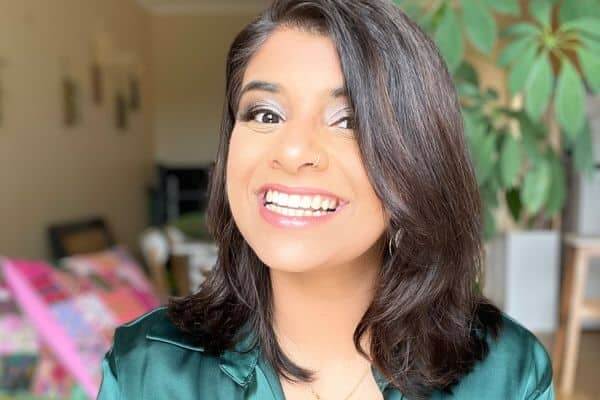Cutting Chai with Lakshmi Ganapathy is a monthly series of bite-sized interviews with prominent South Asians showcasing their career and personality and celebrating their South Asian Australian identity.
ANUSHKA PHAL is an educational developmental psychologist and founder of Umeed Psychology, a private practice and social enterprise providing accessible, culturally informed mental health support. She is also a founding member of Guardians of The Pacific, Co-Host of the ‘Girls That ADHD’ podcast, and a 2023 Inductee into the Victorian Honour Roll of Women.
Lakshmi Ganapathy: What’s your current ‘umeed’ for Australia’s mental healthcare system?
Anushka Phal: Start making mental health care accessible for everyone. It’s great that we have 10 Medicare rebated [sessions]. But there’s a disparity in how much you receive if you’re seeing a clinical psychologist versus any other type of psychologist…everyone should be getting the same rebate. Finances are a big barrier for a lot of people seeking mental health service.
People say therapists should just reduce their fees. Trust me, we’re trying…we’re people too and we have to pay for things like admin in the background. We don’t get to keep that whole amount for that one hour. I think that’s important [to balance], that the therapist is getting paid but everybody else is also getting access to mental healthcare from a financial standpoint.
On a more multicultural level, start having curriculum in universities around culturally responsive practice. It’s been long enough that mental health practice has been grounded within this Eurocentric lens, and culturally responsive practice has been taking a back seat when really it needs to be the driving force.
I think my last hope is we stop measuring the effectiveness of mental health outcomes on productivity. I am tired of hearing ‘mental health costs Australia $10 million plus every year’…if we provide the appropriate services for everybody, their outcomes will naturally be good and that will eventually affect the economy. People are people, the reality is there are social and cultural determinants of health that affect everybody.
Lakshmi Ganapathy: If you had to counsel yourself, what would you say?
Anushka Phal: ‘Just because you can, doesn’t mean you should’…in the past I’ve fallen into the habit of trying to do all the things because my empathy gets really big and I’m like, okay, we need to be doing all of these different things!
View this post on Instagram
A balanced life doesn’t have to be ‘5:00 AM doing your gratitude journal drinking your herbal tea going for a run and then doing your productive day.’ It can be you get up, you ate breakfast and you watched TV, and then you had a good day because you did enough work and not too much work. That’s probably a big one. Balance is something that I struggle with a lot.
Lakshmi Ganapathy: Lots of multicultural mental health practitioners are talking about ‘breaking intergenerational trauma and patterns’. What does this actually look like?
Anushka Phal: Something that might have happened to your great grandparents is still affecting you right now because that has trickled down and had a cause and effect. A classic example of this is Partition…a family that otherwise would have been thriving suddenly went into survival mode and all that mattered during that time was keeping a roof over your head, educating your kids, and having food on the table. What I’m finding with people between the ages of about 20 to 35 is that group of people really struggle to break the trauma of survival and actually enjoy thriving, and there’s a bit of guilt, like ‘Life is good. Why is life good? How do I deal with this?’ All those experiences have [also] caused a lot of intergenerational family conflict…parents not getting along with their children, children not getting along with their parents.
View this post on Instagram
At the end of the day, the key is trying to understand your own intergenerational patterns and your own intergenerational history. Knowing what your traumas are and being able to break through those traumas – that happens through discussion, which is a big barrier in South Asian families to begin with. We don’t talk about things…I think that’s where emotional literacy is important, like, it’s okay to have feelings.
Lakshmi Ganapathy: What’s something that you’re currently listening to/reading/playing/watching?
Anushka Phal: This is going to be so nerdy! I’ve been going through my Percy Jackson phase this year – been obsessed with Greek mythology because I needed something that was a little bit more in touch with my childhood.
If you’re South Asian or even from a multicultural background, read Chai Time in Cinnamon Gardens by Shankari Chandran, and I just finished reading All That’s Left Unsaid by Tracy Lien.
Lakshmi Ganapathy: What’s a word that you like in a South Asian language, and what does it mean?
Anushka Phal: I’m going to be really biased and say ‘umeed’ [which means hope in Urdu]. I started my business on a whim, somebody called me, and they were sad, and then I was like, ‘give me a day’ and then I registered an ABN. So, I hadn’t really thought about [the name] too much, but I think since then I’ve had a lot of time to reflect and it’s a beautiful word because hope can mean so many things for so many different people. I’m such a big believer that a little bit of hope goes such a long way; if you have just a little bit of ‘umeed’ in yourself or the world or whatever it is, you can make it, you know.
View this post on Instagram
Lakshmi Ganapathy: And finally: Soan Papdi or Papdi Chaat?
Anushka Phal: Papdi Chaat. My neuro-spicy brain has [strong] feelings about the texture of Soan Papdi.
READ ALSO: Cutting Chai with Kano Ravalji





